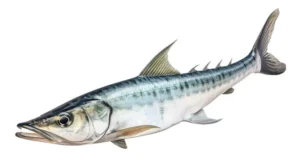Barracudas are interesting fish that are found in tropical and subtropical zones around the world. These are usually the ones that strike the minds of so many water-loving people, yet they also pose a curiosity for seafood lovers and hungry curious people, like: can you eat barracuda? This guide will give you a complete look at barracuda fish’s world, their characteristics, and first and foremost, whether they are safe and right to eat for human beings.
What Is a Barracuda Fish?
Barracuda, can you eat it or not? That is the question which we shall be grappling with in this article.
If we look at the food chain, we see a place filled with various organisms. There are many fish that eat larger fish, and barracudas are among them. The way they can stretch their bodies, their ferocious jaws, and strong jaws to quickly swallow their prey on the way to the open sea and their needle-like, very sharp and toothed melee that they catch them with, it is not always possible for me to like the barracuda besides its looks and it is a warrior. That is why people have considered them as their marine species associates for many years.
Key characteristics of barracuda fish include:
- Size: Depending on the species, barracudas can grow anywhere from 50 cm to over 1.8 meters in length.
- Appearance: They have a distinctive torpedo-shaped body with a large mouth and prominent, fang-like teeth.
- Habitat: Barracudas are found in tropical and subtropical oceans worldwide, including the Atlantic, Pacific, and Indian Oceans.
- Behavior: They are known for their aggressive hunting tactics and can swim at speeds of up to 35 mph in short bursts.
Can You Eat Barracuda Safely?
Now, let’s address the burning question: can you eat barracuda? The short answer is yes, you can eat. But some important caveats are also there.
Barracuda can be eaten and consumed in many parts of the world, particularly in regions where they are abundant. However, there are several factors to consider before adding barracuda to your menu:
- Ciguatera poisoning risk
- Mercury content
- Local regulations and guidelines
- Culinary preferences and preparation methods
Let’s explore each of these factors in detail to help you make an informed decision about whether you should eat barracuda.
The Major Concern of Ciguatera Poisoning
The most significant risk associated with eating barracuda is ciguatera poisoning. Ciguatera is a foodborne illness caused by consuming fish that have accumulated ciguatoxins produced by certain microalgae.
Barracudas, especially larger specimens, are more likely to accumulate these toxins because they are apex predators that feed on smaller fish that have ingested the toxin-producing algae. The risk of ciguatera poisoning is higher in tropical and subtropical regions, particularly in the Caribbean, Pacific, and Indian Oceans.
Symptoms of ciguatera poisoning can include:
- Gastrointestinal issues (nausea, vomiting, diarrhea)
- Neurological symptoms (tingling sensations, reverse temperature sensation)
- Cardiovascular problems (irregular heartbeat, low blood pressure)
Due to the risk of ciguatera poisoning, many health authorities advise against eating large barracudas or those caught in known ciguatera hotspots.
Mercury Content
Like many large predatory fish, barracudas can accumulate high levels of mercury in their tissues. Mercury is a toxic heavy metal that can cause serious health problems, especially for pregnant women, nursing mothers, and young children.
The mercury content in barracuda can vary depending on factors such as:
- Size of the fish (larger fish typically have higher mercury levels)
- Age of the fish
- The location where the fish was caught
Due to these concerns, some health organizations recommend limiting or avoiding the consumption of barracuda, especially for vulnerable populations.
Local Regulations and Guidelines
If you’re looking for an answer to the question can you eat barracuda in your area, then it’s essential to check local regulations and guidelines. Many regions have specific advisories or restrictions on barracuda consumption due to the risks mentioned above.
For example:
- Some Caribbean islands have bans or strict guidelines on selling or consuming large barracudas.
- In Florida, the Department of Health advises against eating barracuda caught in certain areas.
- Various Pacific island nations have their guidelines for safe barracuda consumption.
Always consult local fishing and health authorities for the most up-to-date information on whether you can eat barracuda in your region.
Culinary Aspects of Eating Barracuda
Despite the potential risks, barracuda are eaten in many cultures and can be prepared in various ways. If you decide to eat barracuda (after considering the health risks and local guidelines), here’s what you should know:
Taste and Texture:
- Barracuda meat is firm and lean with a mild flavor.
- Some describe it as similar to grouper or snapper.
Popular Preparation Methods:

- Grilling
- Baking
- Frying
- Smoking
- Using in fish stews or soups
Culinary Tips:
- Smaller barracudas (under 3.5 feet) are generally considered safer to eat.
- Always ensure the fish is properly cleaned and filleted.
- Cook thoroughly to reduce the risk of foodborne illnesses.
Alternatives to Eating Barracuda
Given the potential risks associated with eating barracuda, you might want to consider safer alternatives that offer similar culinary experiences:
- Mahi-mahi (dolphinfish)
- Snapper
- Grouper
- Wahoo
- Swordfish (in moderation due to mercury content)
These fish can often be prepared using similar methods and recipes as barracuda, providing a safer option for those concerned about ciguatera or mercury poisoning.
The Ultimate Line
So the final say on the topic, can you eat barracuda safely? In summary, although barracuda can be eaten by you, it is also accompanied by a wide range of dangers that should not be underestimated. It is, therefore, a risky option for consumption as a result of ciguatera poisoning and high mercury content.
Still want to try some barracuda, then:
- Check local guidelines and regulations.
- Opt for smaller specimens when possible.
- Be aware of the source and fishing location.
- Prepare the fish properly and thoroughly.
- Consider the health risks, especially if you’re in a vulnerable group.
Irrespective of whether the barracuda is required to be taken in small quantities, mainly depends on various factors, until one considers it and makes a decision, following the most up-to-date scientific information and local health advisories. In general, it’s wiser to stick to safe fish alternatives rather than to risk your health and taste with species that are not local to your place. Keep in mind that along the way to exploring new seafood, you enjoy, health and among other things should be the prime movers of your diet.







